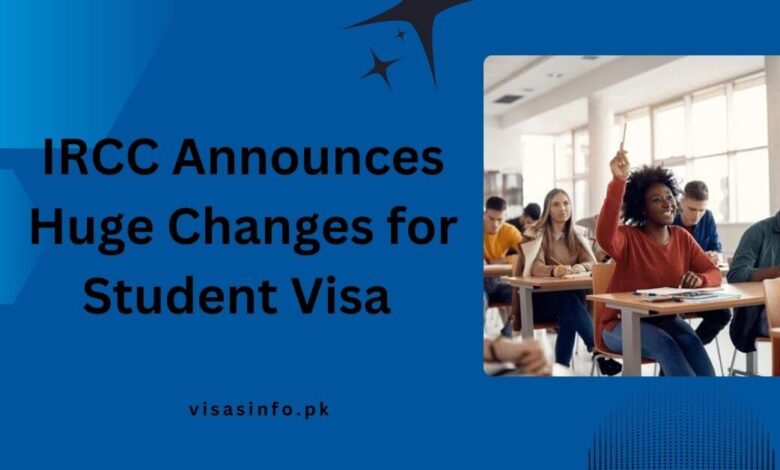IRCC Announces Huge Changes for Student Visa 2024

This article examines the future of international student programs in Canada, as well as the effects of scheduled reforms. Recently, the Canadian Immigration, Refugees and Citizenship Services (IRCC) have been deliberating the feasibility of reforming the international student program.
If you are an international student or are contemplating the application for a study visa in Canada, you may be curious about the impact of these revisions. This in-depth analysis will investigate the proposed modifications, the reasons Canada remains a popular choice for overseas students, and how these reforms aim to address current issues while preserving the program’s integrity.
Canada is a top choice for international scholars.
There are numerous factors why Canada is a top choice for international students. It is home to exceptional educational institutions, such as prestigious colleges and universities that have a stellar reputation for academic excellence. Furthermore, Canada is distinguished by its inclusivity and diversity, which attracts students from around the globe.
The Canadian Society is renowned for its multiculturalism, which provides a dynamic experience for international students. Additionally, Canada is one of the most alluring countries in the world for higher education because it offers graduates a diverse array of opportunities for permanent residency, immigration, or employment.
Obstacles encountered by international students
Even though international students make substantial contributions to Canadian campuses by volunteering and enhancing the overall academic environment, they encounter numerous challenges as they pursue their degrees. The international student program must be reformed to resolve these issues and to ensure a more secure and seamless process.
The Significance of Proposed Reforms
The proposed modifications to the Canadian program for international students are indicative of a commitment to enhancing the overall experience of these students and addressing the current challenges they encounter. The minister of immigration, refugees, and citizenship has initiated numerous initiatives to strengthen the program and protect students from deception.
Effective December, an improved verification process will be implemented.
Starting all postsecondary Designated Learning Institutions (DLIs) will directly verify each applicant’s acceptance letter with the IRCC. This enhanced verification procedure aims to prevent acceptance deception by ensuring that phony admission letters are no longer accepted. This safeguard will protect potential students from deception and ensure that study permits are only issued in response to genuine acceptance offers.
Institutions that have been acknowledged, as of the fall of 2024
Beginning in the autumn of 2024, the Canadian government plans to establish a recognized institutional framework. This system will prioritize post-secondary DLI that have demonstrated exceptional success in supporting international students and facilitating their exceptional academic performance.
Universities that have a demonstrated history of assisting international students in securing employment are prioritized during the study visa application process. This initiative will benefit both students and universities by connecting them with the institutions that are best suited to support their academic and career aspirations.
Check Also: Financial Aid for International Students in Canada
Benefits of IRCC Announces Huge Changes Student Visa
- Streamlined Processing: IRCC is reducing the waiting time for applicants by instituting faster and more efficient processing for study permits. This enables students to commence their studies without any delays.
- latitude in Work Permits: Students may now have greater latitude in their post-graduation work permits (PGWP) under the new regulations. This encompasses the extension of work permit durations, which will allow students to acquire valuable Canadian work experience following their academic pursuits.
- Streamlined Pathway to Permanent Residency: The student visa process may also be enhanced by changes, as Canadian work experience acquired during a PGWP is frequently regarded as valuable in immigration applications.
- IRCC is broadening: the eligibility for study visas to encompass a broader range of programs, including short-term programs, to facilitate the arrival of students in Canada for a variety of educational pursuits.
- Family Benefits: Certain modifications enable the spouses and dependents of international students to obtain work permits or visas, thereby simplifying the process of maintaining a family unit in Canada.
- Flexibility in Study Caps: Certain institutions may implement a cap on the number of international students to facilitate improved student service administration, thereby enhancing the quality of education.
Evaluation of the Post-Graduation Work Permit Program
In the forthcoming months, the IRCC intends to conduct an exhaustive assessment of the post-graduation work permit program (PGWP). The primary goal of this assessment is to ensure that the program’s prerequisites are more by the demands of the Canadian employment market and the country’s objectives for francophone and regional immigration.
The PGWP is crucial to the economic development of Canada, as it ensures that international students remain in the country, thereby assisting in the closure of labor market gaps. Consequently, the proposed modifications are intended to develop a curriculum that maximizes the economic and social contributions of international students to Canada.
The Economic Importance of International Students
The contributions of international students are a significant component of Canada’s GDP. Their presence generates over 22 billion dollars in economic activity annually, surpassing the export revenues of specific industries, including aircraft and auto parts. Furthermore, this sector generates more than 200,000 employment opportunities across the country.
Nevertheless, the economic impact of international students was significantly impacted by the COVID-19 pandemic, resulting in a decrease of over $7 billion in Canada’s GDP. In order to safeguard pupils and the nation’s interests and sustain the expansion of this indispensable economic sector, reforms are imperative.
Participation in Continuous Improvement
The proposed enhancements were the result of a comprehensive process that involved analysis, assessment, and consultation with significant stakeholders. Nevertheless, they are not the outcome of arbitrary decision-making. In order to ascertain these proposed modifications, the IRCC conducted seminars, solicited input from academic institutions, and collaborated with the provinces and territories.
The goal is to create a program for international students that is both secure and compliant with Canadian immigration laws, and is driven by the labor market and immigration.
Prospective and current international students will find the forthcoming modifications to the Canadian international student program to be a positive adjustment. The purpose of these measures is to address current issues and enhance the program as a whole, thereby safeguarding its integrity while Canada continues to be a popular destination for international students.
These modifications continue to bolster its status as a pioneer in international education. The recommendation is uncomplicated for those who elect to pursue their academic objectives in Canada: remain informed, embrace the modifications, and continue to pursue your academic objectives in this dynamic and amiable nation. International education in Canada appears to be more promising than ever.
Frequently Asked Questions:
-
What is the new update on student visa Canada?
College and University Transfer Restrictions
One of the most critical changes is that international students will no longer be allowed to change their college or university after arriving in Canada without reapplying for a new study permit.
-
Is Canada declining student visa?
The government aimed for 35% fewer approved study permits in 2024, but ApplyBoard projects a 47% decline. Even Canadian post-secondary programs not included in the cap are seeing double-digit application drops, indicating that new policies broadly affect the “study in Canada” brand abroad.
-
Why will student visa be rejected?
FAILURE TO MEET ACADEMIC QUALIFICATION. Now this requirement is to be expected. To qualify for a student visa, you’re going to have to qualify as a student. This translates to: you’ll need to have completed the required academic level to study further.



